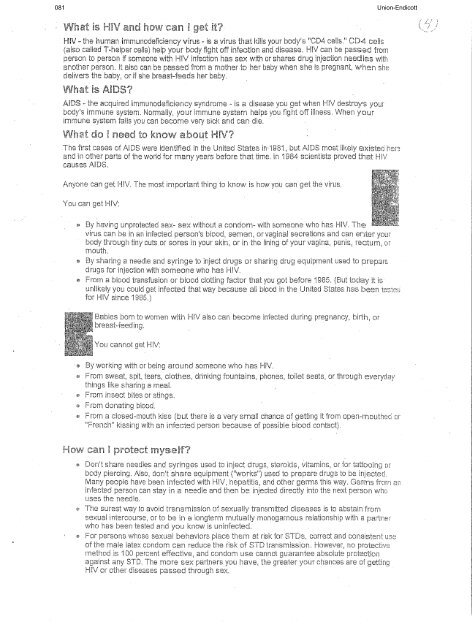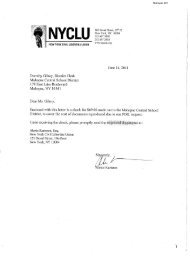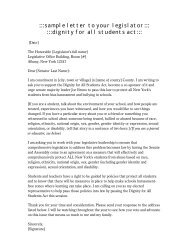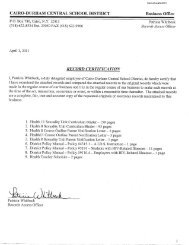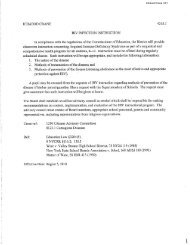t - New York Civil Liberties Union
t - New York Civil Liberties Union
t - New York Civil Liberties Union
You also want an ePaper? Increase the reach of your titles
YUMPU automatically turns print PDFs into web optimized ePapers that Google loves.
081<br />
<strong>Union</strong>-Endicott<br />
'#\fnat<br />
is HIVand how can I get it?<br />
H!V - the humanimmuncdeñciency virus - is a virus that kills your body's "C1J4cells," CD4 cells<br />
(also called T ..helper cells) help your body fiÇJl1toff infection and disease, HIV can be passed from<br />
person to person if someone with HIV infection has sex with or shares drug injection needles with<br />
another person. It also can be passed from a mother.to her baby when she ls pregnant, when she<br />
delivers the baby, or if she breast-feeds her baby,<br />
ll\/hat IS I~IDS?<br />
A¡DS ",the acquired lrnmunodeñciency syndrome" is a disease you get when HIV destroys your<br />
body's immune system. Normally, your immune system helps you fiç¡ht off illness, When l'our<br />
immune system faits you can become very sick and can die.<br />
\Nh~itdo ! need to know about HiV?<br />
The first cases of AIDS were identified in the United States in'1981, but /-,IDS most likely existed hers<br />
and in other parts of tile world for many years; before that Urne.In 1884 scientists proved that HIV<br />
causes AIDS.<br />
Anyone can [Jet HIV. The most important thing to know is how you can get the virus,<br />
You can get HIV:<br />
£. Dy having unprotected S8)('" sex without a condorn- with someone who has HIV, The ,',<br />
virus can be in an infected person's blood, semen, or vaginal secretions and can enter your<br />
body throuqh tiny cuts or sores in your skin, or in the linint~of your vagina, penis, rectum, or<br />
mouth.<br />
® By sharing El needle and syringe to inject drugs or sharing drug equipment used to prepars<br />
drugs fal" injection with someone who has HIV.<br />
~ Frem a blood transfusion or blood clotting factor that you got before 19B£),(Elut today it is<br />
unlikely you could get infected that way because ali blood in the United States has been tem:eö<br />
1'01' HIV since 1985.)<br />
Babies born to women with HIVaiso can become infected during pregnancy, birth, Dr<br />
breast ..feeding.<br />
You cannot get HIV:<br />
\~ By working with m being around someone who has HIV.<br />
@ From sweat, spit, tears, clothes, drinking fountains, phones, toilet seats, or through everyday<br />
things like sharing a meal.<br />
., From insect bites or stings.<br />
(1' r: rom donating blood.<br />
~, From El closed-mouth kiss (but there is El very small chance of getting it from open-mouthed Ol'<br />
"French" kissing with Bn infected person because of possible blood contact),<br />
How can I protect myself?<br />
§I. Don't share needles and syringes used to inject drugs, steroids, vitamins, or for tattooinp Ol"<br />
body plercinç. Also, don't share equipment ("works") used to prepare drugs to be injected,<br />
Many people have been infected with HIV, hepatitis, and other çJC-;3fTnS this way, Germs from Dn<br />
infected person can stay in a needle and then be injected directly into the next person who<br />
use~:;the needle,<br />
e;, The surest way to avoid transmission of sexually transmitted diseases is to abstain l'rom<br />
sexual intercourse, or to be in a longterm mutuallymonoqarnous relationship with El partner<br />
who has been tested and you know is uninfected.<br />
fr) For persons whose sexual behaviors place them at risk for STDs, correct and consistent use<br />
of the male latex condom can reduce the risk of STD transmission. However, 110 protective<br />
method is " 00 percent effective, and condom use cannot guarantee absolute protection<br />
against any STD. The more sex partners you have, the 9reater your chances are of getting<br />
H!V or other diseases passed throuçh s'ex,


